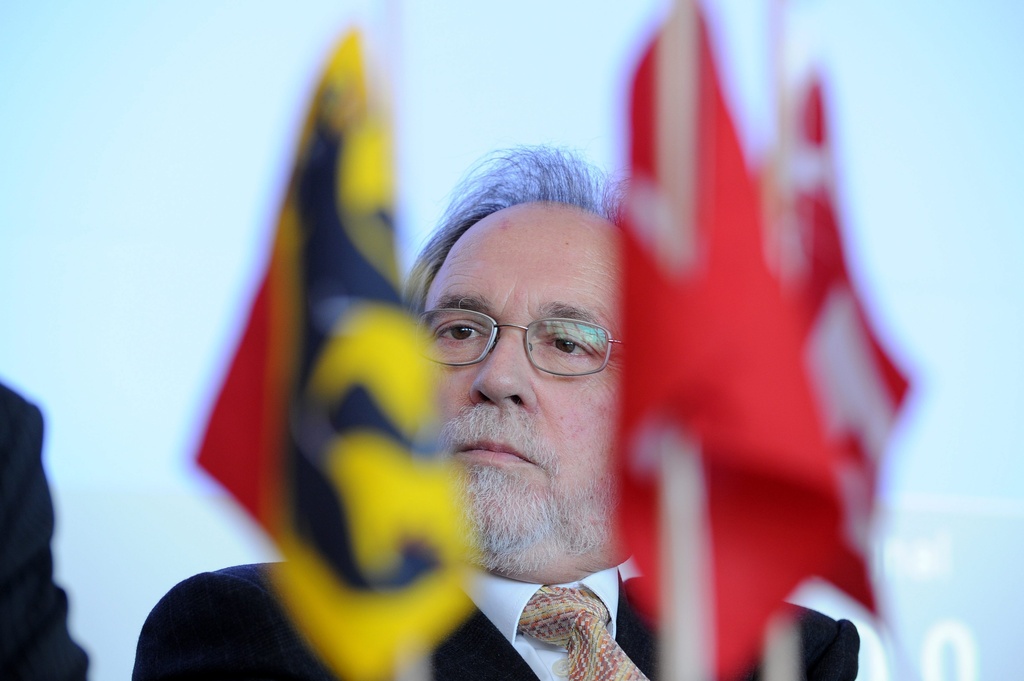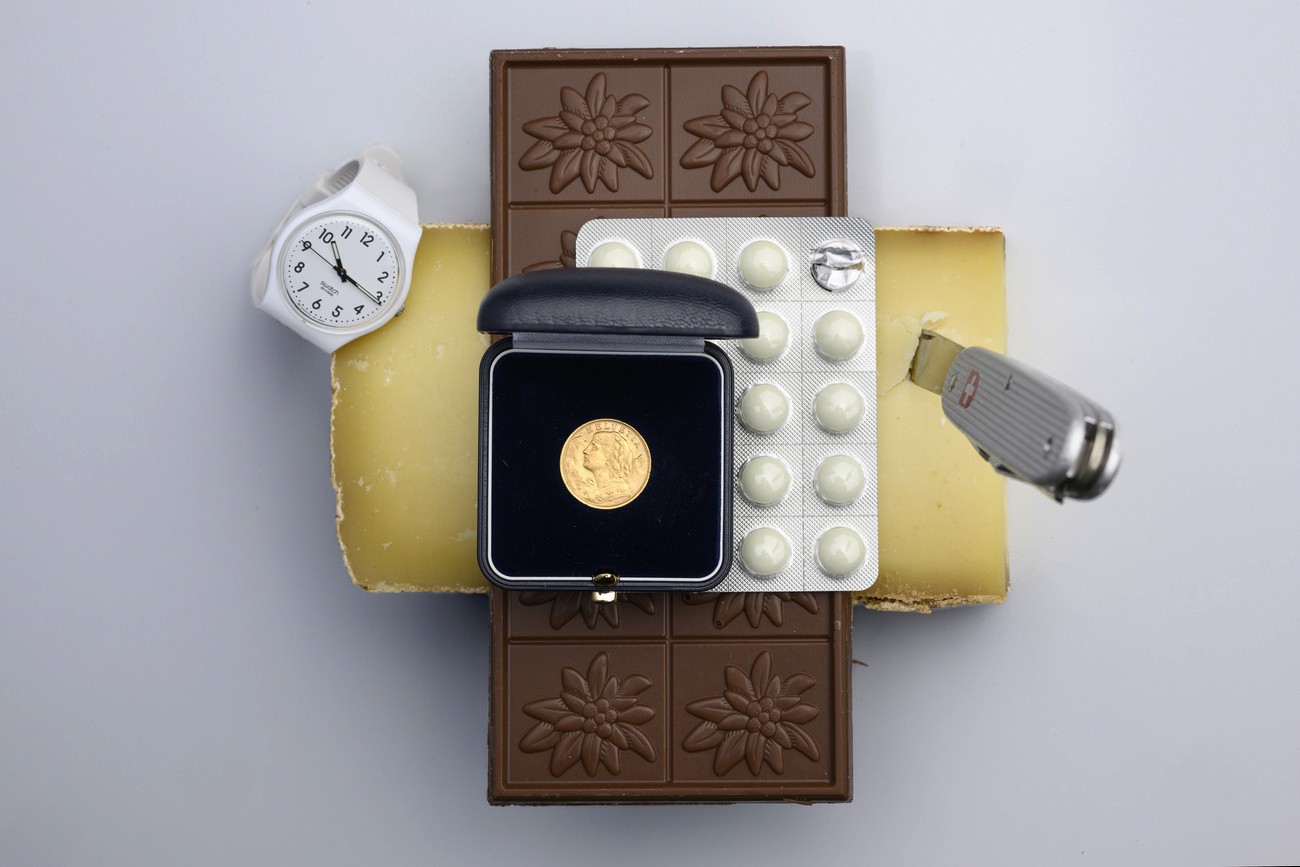
Senator Dick Marty aims to solve Jura conflict

Dick Marty, known for his research into United States prisons in Guantanamo and events in Kosovo, has a new challenge: solving a long conflict in the Jura region.
A member of the Swiss Senate, he is now president of the Inter-Jura Assembly, a body created in 1994 to help promote rapprochement between cantons Bern and Jura in the western part of the country.
At the heart of the strife are underlying linguistic and religious differences, as well as economic and political problems. Marty tells swissinfo.ch that it is his role to facilitate dialogue.
Marty, from canton Ticino in southern Switzerland and a member of the centre-right Radical Party, is known as a man who is not shy of delicate missions.
Having led investigations into the secret prisons in Guantanamo of the US Central Intelligence Agency and uncovered violence against Chechen rebels, he recently stirred up a hornets’ nest when he turned his attention to Kosovo.
A report for the Council of Europe alleged that civilians detained by the Kosovo Liberation Army (KLA) were shot dead in northern Albania so their kidneys could be extracted and sold on the black market after the war in Kosovo ended in 1999.
swissinfo.ch: You recently chaired the first meeting of the Inter-Jura Assembly. Why did you accept this job?
Dick Marty: Cantons Bern and Jura wanted this and there was no good reason why I should refuse. The Jura issue explains rather well the way in which Switzerland manages to resolve conflicts. Everywhere else in the world where there are problems of identity, language, ethnic groups or religion, the answer is usually violence, exclusion or secession. In Switzerland, we have the advantage of a culture of dialogue and we establish institutions that may be slow but which allow us to solve problems. It is fascinating.
swissinfo.ch: After secret CIA prisons and the alleged trafficking of organs in Kosovo, isn’t the Jura problem a little trivial?
D.M.: There is no such thing as trivial combat, but problems that affect people in different ways. Of course there are more serious conflicts in the world and the reality in the Jura has nothing to do with that in Chechnya or the Balkans. But let’s look around a little. Belgium is a country which has similarities with Switzerland socially and economically but it is incapable of putting into place some kind of mechanism similar to that which is in place for the Jura issue.
swissinfo.ch: How do you see your mission?
D.M.: Solutions have to be found by the cantons. As a representative of the government, I have to make sure that dialogue continues. My role is to put forward suggestions when there are “delicate” moments so we can later make concrete decisions. We have found a way to talk to each other but it’s clear that the most difficult decisions are yet to come up.
swissinfo.ch: Is a new vote on the Jura question inevitable?
D.M.: The Inter-Jura Assembly has done remarkable work over the past few years, which ended with a report presented in 2009. It suggests there are two ways to move forward. The first would be creating a new canton with six communes – three for canton Jura and three for the Bernese Jura region. The second, called the status quo plus, also foresees the merger of communes.
It’s now up to the cantons of Bern and Jura to decide how to deal with this report. I think it will be difficult to deny people the right to have their say. Eventually it will come to a national vote, but we’re not there yet.
swissinfo.ch: Apart from some militants, do you have the feeling that the Jura issue still interests the people concerned?
D.M.: I still remember vividly the very tense climate which existed in the 1960s and 1970s. I was a student in Neuchâtel at the time and I had close contact with students from both the north and south of the Jura. Tensions have eased and I think younger generations find it a little difficult to understand the dimension of the conflict. But just because the emotions are not the same, there’s no reason to deny there’s a problem.
swissinfo.ch: Isn’t the Jura issue a rearguard action at a time when the thinking is increasingly in terms of bigger built-up areas?
D.M.: The Jura issue will perhaps be solved when the question of federalism is seriously looked at nationally. Cantons have become too weak, and the government and federal administration too strong. Given the new realities of society and the economy, as well as new possibilities of mobility, we should create much larger cantons, which are stronger and capable of taking on their functions. One could imagine that the number of cantons may one day be reduced to nine or ten. The Switzerland of 26 cantons risks soon becoming a thing of the past.
The Jura conflict began after the former episcopal principality of Basel was merged with the canton of Bern at the Congress of Vienna in 1815.
It was fed by the tensions between the French-speaking, Catholic population of the Jura and the German-speaking, Protestant canton Bern.
After the Second World War a separatist movement in the Jura became a serious problem for canton Bern, and ultimately for Switzerland as a whole.
Canton Jura was created after the failure of all attempts to integrate the minority Jura population into canton Bern.
Canton Jura officially came into being on January 1, 1979.
The Inter-Jura Assembly said it was up to voters in the cantons of Bern and Jura to choose between the enlargement of Jura or granting more autonomy to the region within canton Bern.
The region, with a population of about 55,000, is presently part of Bern but has remained a bone of contention after the creation of canton Jura – seen as a model for conflict resolution in modern-day Switzerland.
At the heart of the strife are underlying linguistic and religious differences, as well as economic and political problems.
(Translated from French by Robert Brookes)

In compliance with the JTI standards
More: SWI swissinfo.ch certified by the Journalism Trust Initiative





























You can find an overview of ongoing debates with our journalists here . Please join us!
If you want to start a conversation about a topic raised in this article or want to report factual errors, email us at english@swissinfo.ch.